外研版八年级上册Module5Lao She Teahouse.Unit3Revision课件(共19张PPT)
文档属性
| 名称 | 外研版八年级上册Module5Lao She Teahouse.Unit3Revision课件(共19张PPT) |  | |
| 格式 | zip | ||
| 文件大小 | 4.1MB | ||
| 资源类型 | 教案 | ||
| 版本资源 | 外研版 | ||
| 科目 | 英语 | ||
| 更新时间 | 2022-06-05 13:22:23 | ||
图片预览


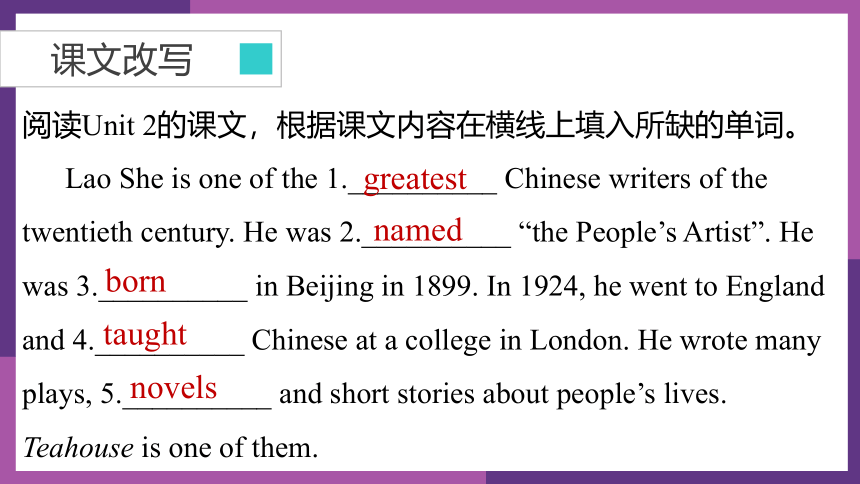
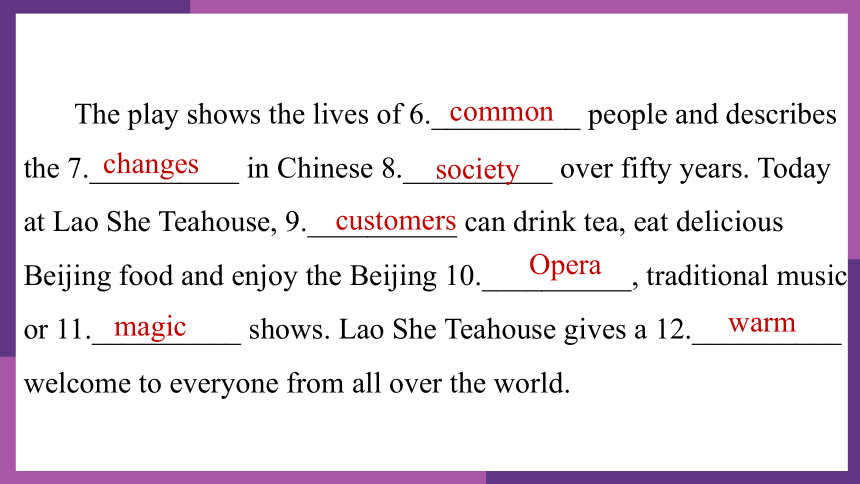
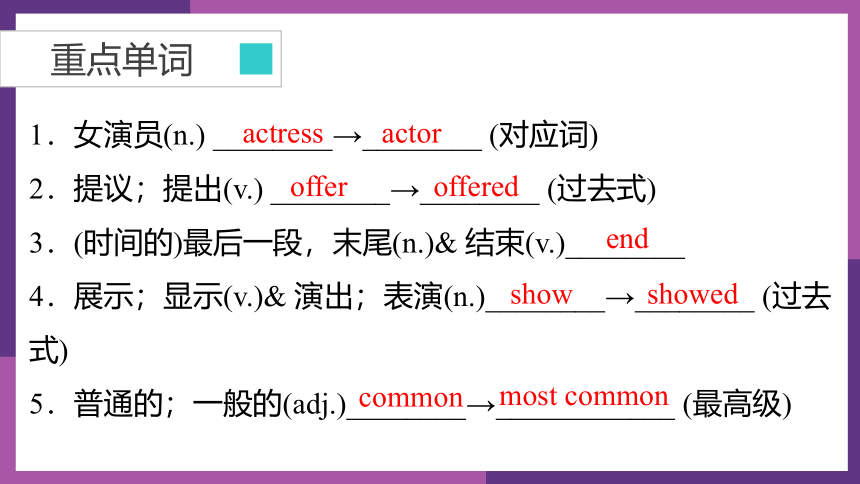
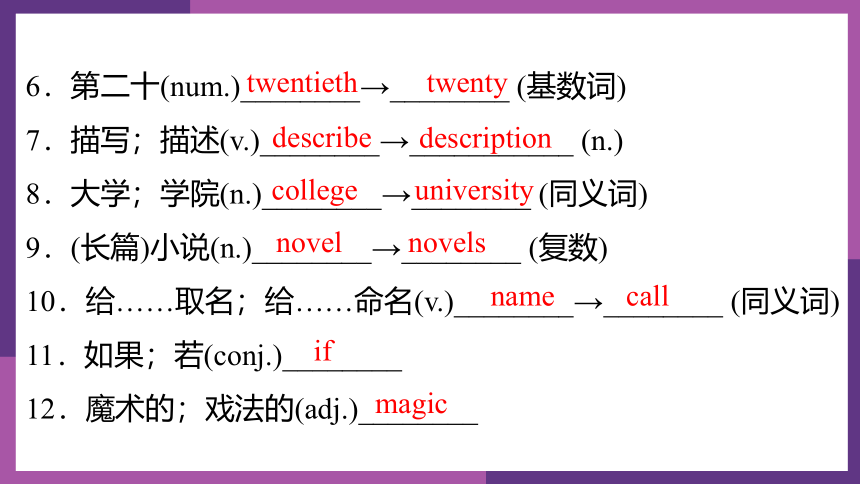
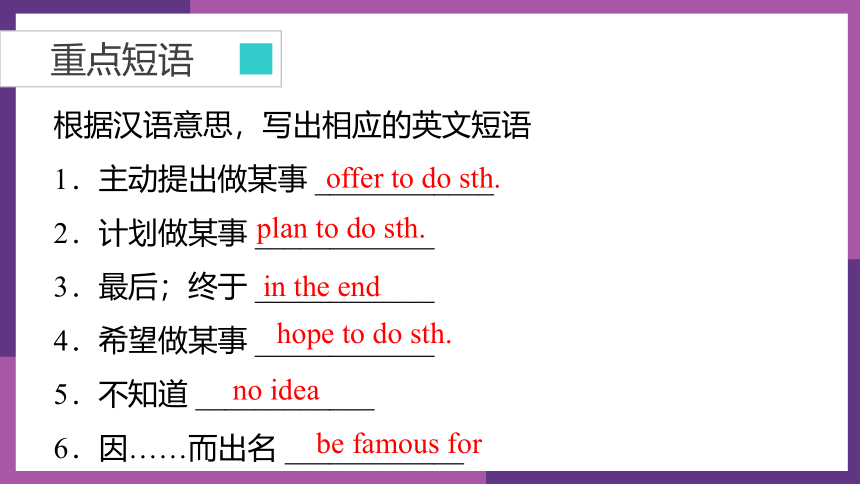
文档简介
(共19张PPT)
Revision for Module 5
Learning objectives
1. To review the key words and sentences.
2. To act out a scene from a play.
课文改写
阅读Unit 2的课文,根据课文内容在横线上填入所缺的单词。
Lao She is one of the 1.__________ Chinese writers of the twentieth century. He was 2.__________ “the People’s Artist”. He was 3.__________ in Beijing in 1899. In 1924, he went to England and 4.__________ Chinese at a college in London. He wrote many plays, 5.__________ and short stories about people’s lives. Teahouse is one of them.
greatest
named
born
taught
novels
The play shows the lives of 6.__________ people and describes the 7.__________ in Chinese 8.__________ over fifty years. Today at Lao She Teahouse, 9.__________ can drink tea, eat delicious Beijing food and enjoy the Beijing 10.__________, traditional music or 11.__________ shows. Lao She Teahouse gives a 12.__________ welcome to everyone from all over the world.
common
changes
society
customers
Opera
magic
warm
重点单词
1.女演员(n.) ________→________ (对应词)
2.提议;提出(v.) ________→________ (过去式)
3.(时间的)最后一段,末尾(n.)& 结束(v.)________
4.展示;显示(v.)& 演出;表演(n.)________→________ (过去式)
5.普通的;一般的(adj.)________→____________ (最高级)
actress
actor
offer
offered
end
show
showed
common
most common
6.第二十(num.)________→________ (基数词)
7.描写;描述(v.)________→___________ (n.)
8.大学;学院(n.)________→________ (同义词)
9.(长篇)小说(n.)________→________ (复数)
10.给……取名;给……命名(v.)________→________ (同义词)
11.如果;若(conj.)________
12.魔术的;戏法的(adj.)________
twentieth
twenty
describe
description
college
university
novel
novels
name
call
if
magic
重点短语
根据汉语意思,写出相应的英文短语
1.主动提出做某事 ____________
2.计划做某事 ____________
3.最后;终于 ____________
4.希望做某事 ____________
5.不知道 ____________
6.因……而出名 ____________
offer to do sth.
plan to do sth.
in the end
hope to do sth.
no idea
be famous for
7.20世纪中叶 ____________________________
8.中国社会 ____________
9.一所师范学校 ____________
10.教汉语 ____________
11.回到中国 ____________
12.五年后 ____________
13.被叫作 ____________
the middle of the twentieth century
Chinese society
a teacher's school
teach Chinese
return to China
five years later
be named
14.人民艺术家 _________________
15.魔术表演 ____________
16.热烈欢迎某人 ________________________
17.看京剧 ____________________
18.同时 ____________
19.在……结束时;在……的尽头 ____________
20.发生;举行 ____________
the People's Artist
magic shows
give a warm welcome to sb.
see the Beijing Opera
at the same time
at the end of
take place
重点句型
根据汉语意思完成句子
1.我想看京剧,所以玲玲主动提出带我去那儿。
I wanted ________ ________ the Beijing Opera, so Lingling offered ________ ________ me there.
2.很难听懂台词。
It was difficult ________ ____________ the words.
to understand
to see
to take
3.我希望下次能听懂更多。
I hope ________ ________ more next time.
4.老舍是一位伟大的作家。他尤其因他的话剧《茶馆》而出名。
Lao She is a great writer. He's ________ ________ ________ his play Teahouse.
5.它向我们讲述了王利发和他北京茶馆里顾客的故事。
It ________ ________ the story of Wang Lifa and the customers of his teahouse in Beijing.
especially famous for
tells us
to understand
6.老舍是20世纪中国最伟大的作家之一。
Lao She is one of the ______ Chinese ______ of the _______ century.
7.老舍茶馆热情地欢迎来自世界各地的每一个人。
Lao She Teahouse ________ a ________ ________ ________ everyone from ________ ________ the world.
8.话剧有三幕,展示了中国普通人的生活。
The play has three ________ and ________ the ________ of common people in China.
greatest writers twentieth
gives warm welcome to
all over
acts shows lives
9.它描述了中国社会50多年的变化。
It ________ the changes in ________ ________ ________ fifty years.
10.他在伦敦的一所大学里教中文,五年后他回到了中国。
He_______Chinese at a college in London and ________ ________ China five years ________.
11.对于每个人来说,理解这个故事很容易。
It's easy ________ everyone ________ ________ the story.
describes Chinese society over
taught returned to
later
for to understand
12.起初,鲁迅希望帮助中国人民变得健康强壮,所以他决定成为一名医生。
________ ________, Lu Xun hoped ________ ________ the Chinese people ________ healthy and strong, so he decided ________ ________ a doctor.
At first to help
become
to be
Western theatre started in Greece, around 600 BC. The theatres were very big. About 15, 000 people could watch a play at the same time. The audience sat on stone seats to watch the performances. Some of the theatres survive, as do some of the plays by ancient Greek writers. People still watch these plays today.
Theatres
Around the world
Work in groups. Find a play. Think about these questions.
9
1 Where does it take place
2 Who is in it
3 What is the story
4 What are the special moments in it
Choose a scene and practise it.
10
Act out the scene in front of the class.
11
GOOD JOB
Revision for Module 5
Learning objectives
1. To review the key words and sentences.
2. To act out a scene from a play.
课文改写
阅读Unit 2的课文,根据课文内容在横线上填入所缺的单词。
Lao She is one of the 1.__________ Chinese writers of the twentieth century. He was 2.__________ “the People’s Artist”. He was 3.__________ in Beijing in 1899. In 1924, he went to England and 4.__________ Chinese at a college in London. He wrote many plays, 5.__________ and short stories about people’s lives. Teahouse is one of them.
greatest
named
born
taught
novels
The play shows the lives of 6.__________ people and describes the 7.__________ in Chinese 8.__________ over fifty years. Today at Lao She Teahouse, 9.__________ can drink tea, eat delicious Beijing food and enjoy the Beijing 10.__________, traditional music or 11.__________ shows. Lao She Teahouse gives a 12.__________ welcome to everyone from all over the world.
common
changes
society
customers
Opera
magic
warm
重点单词
1.女演员(n.) ________→________ (对应词)
2.提议;提出(v.) ________→________ (过去式)
3.(时间的)最后一段,末尾(n.)& 结束(v.)________
4.展示;显示(v.)& 演出;表演(n.)________→________ (过去式)
5.普通的;一般的(adj.)________→____________ (最高级)
actress
actor
offer
offered
end
show
showed
common
most common
6.第二十(num.)________→________ (基数词)
7.描写;描述(v.)________→___________ (n.)
8.大学;学院(n.)________→________ (同义词)
9.(长篇)小说(n.)________→________ (复数)
10.给……取名;给……命名(v.)________→________ (同义词)
11.如果;若(conj.)________
12.魔术的;戏法的(adj.)________
twentieth
twenty
describe
description
college
university
novel
novels
name
call
if
magic
重点短语
根据汉语意思,写出相应的英文短语
1.主动提出做某事 ____________
2.计划做某事 ____________
3.最后;终于 ____________
4.希望做某事 ____________
5.不知道 ____________
6.因……而出名 ____________
offer to do sth.
plan to do sth.
in the end
hope to do sth.
no idea
be famous for
7.20世纪中叶 ____________________________
8.中国社会 ____________
9.一所师范学校 ____________
10.教汉语 ____________
11.回到中国 ____________
12.五年后 ____________
13.被叫作 ____________
the middle of the twentieth century
Chinese society
a teacher's school
teach Chinese
return to China
five years later
be named
14.人民艺术家 _________________
15.魔术表演 ____________
16.热烈欢迎某人 ________________________
17.看京剧 ____________________
18.同时 ____________
19.在……结束时;在……的尽头 ____________
20.发生;举行 ____________
the People's Artist
magic shows
give a warm welcome to sb.
see the Beijing Opera
at the same time
at the end of
take place
重点句型
根据汉语意思完成句子
1.我想看京剧,所以玲玲主动提出带我去那儿。
I wanted ________ ________ the Beijing Opera, so Lingling offered ________ ________ me there.
2.很难听懂台词。
It was difficult ________ ____________ the words.
to understand
to see
to take
3.我希望下次能听懂更多。
I hope ________ ________ more next time.
4.老舍是一位伟大的作家。他尤其因他的话剧《茶馆》而出名。
Lao She is a great writer. He's ________ ________ ________ his play Teahouse.
5.它向我们讲述了王利发和他北京茶馆里顾客的故事。
It ________ ________ the story of Wang Lifa and the customers of his teahouse in Beijing.
especially famous for
tells us
to understand
6.老舍是20世纪中国最伟大的作家之一。
Lao She is one of the ______ Chinese ______ of the _______ century.
7.老舍茶馆热情地欢迎来自世界各地的每一个人。
Lao She Teahouse ________ a ________ ________ ________ everyone from ________ ________ the world.
8.话剧有三幕,展示了中国普通人的生活。
The play has three ________ and ________ the ________ of common people in China.
greatest writers twentieth
gives warm welcome to
all over
acts shows lives
9.它描述了中国社会50多年的变化。
It ________ the changes in ________ ________ ________ fifty years.
10.他在伦敦的一所大学里教中文,五年后他回到了中国。
He_______Chinese at a college in London and ________ ________ China five years ________.
11.对于每个人来说,理解这个故事很容易。
It's easy ________ everyone ________ ________ the story.
describes Chinese society over
taught returned to
later
for to understand
12.起初,鲁迅希望帮助中国人民变得健康强壮,所以他决定成为一名医生。
________ ________, Lu Xun hoped ________ ________ the Chinese people ________ healthy and strong, so he decided ________ ________ a doctor.
At first to help
become
to be
Western theatre started in Greece, around 600 BC. The theatres were very big. About 15, 000 people could watch a play at the same time. The audience sat on stone seats to watch the performances. Some of the theatres survive, as do some of the plays by ancient Greek writers. People still watch these plays today.
Theatres
Around the world
Work in groups. Find a play. Think about these questions.
9
1 Where does it take place
2 Who is in it
3 What is the story
4 What are the special moments in it
Choose a scene and practise it.
10
Act out the scene in front of the class.
11
GOOD JOB
同课章节目录
- Module 1 How to learn English
- Unit 1 Let's try to speak English as much as possi
- Unit 2 You should smile at her.
- Unit 3 Language in use .
- Module 2 My home town and my country
- Unit 1 It's taller than many other buildings.
- Unit 2 Cambridge is a beautiful city in the east o
- Unit 3 Language in use .
- Module 3 Sports.
- Unit 1 Nothing is more exciting than playing tenni
- Unit 2 This year we training more carefully.
- Unit 3 Language in use .
- Module 4 Planes, ships and trains .
- Unit 1 He lives the farthest from school.
- Unit 2 What is the best way to travel.
- Unit 3 Language in use .
- Module 5 Lao She Teahouse.
- Unit 1 I wanted to see the Beijing Opera.
- Unit 2 It descibes the changes in Chinese society.
- Unit 3 Language in use .
- Module 6 Animals in danger.
- Unit 1 It allows people to get closer to them .
- Unit 2 The WWF is working hard to save them all.
- Unit 3 Language in use .
- Revision module A
- Module 7 A famous story
- Unit 1 Alice was sitting with her sister by the ri
- Unit 2 She was thinking about her cat.
- Unit 3 Language in use .
- Module 8 Accidents
- Unit 1 While the car were changing to red, a car s
- Unit 2 I was trying to pick it up when it bite me
- Unit 3 Language in use .
- Module 9 Population
- Unit 1 The population of China is about 1.37 billi
- Unit 2 Arnwick was a city with 200,000 people.
- Unit 3 Language in use .
- Module 10 The weathe
- Unit 1 It might snow.
- Unit 2 The weather is fine all year round.
- Unit 3 Language in use .
- Module 11 Way of life
- Unit 1 In China ,we open a gift later.
- Unit 2 In England, you usually drink tea with milk
- Unit 3 Language in use .
- Module 12 Help
- Unit 1 What should we do before help arrives?
- Unit 2 Stay away from windows and heavy furniture.
- Unit 3 Language in use .
- Revision module B
